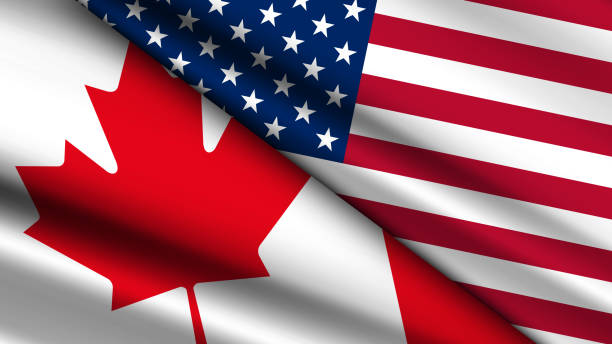Choosing between Canada and USA for higher education represents one of the most critical decisions for international students. Both countries offer world-class education systems with unique advantages and opportunities.
This comprehensive guide examines every aspect of studying in Canada versus the United States. We’ll analyze costs, academic quality, immigration policies, and post-graduation opportunities to help you make an informed decision.
Overview: Canada vs USA Higher Education Systems
Educational Excellence in Both Nations
Both Canada and USA maintain globally recognized higher education systems. The USA offers access to globally ranked universities, diverse programs, and extensive networking opportunities.
Meanwhile, Canada offers the best combination of affordable education, student-friendly immigration policies, and post-graduation work opportunities.
Key Statistics Comparison
Canada Education Highlights:
96 universities offering diverse programs
Average tuition: $36,100 CAD for international students
3-year post-graduation work permit available
USA Education Highlights:
Over 4,000 higher education institutions
Average starting salary: $48,127 USD for graduates
One-year Optional Practical Training (OPT) available
Academic Quality and University Rankings

American universities dominate global rankings with institutions like Harvard, MIT, and Stanford. The USA hosts 8 of the top 10 universities worldwide.
Canadian universities also perform exceptionally well. Universities like University of Toronto, McGill, and University of British Columbia consistently rank among global top 50.
Academic Structure Differences
U.S. colleges often require students to take courses outside their major to graduate, fostering a well-rounded education. Canada has a stronger emphasis on research and specialization, particularly in postgraduate education.
USA Academic System:
Liberal arts foundation with major specialization
Extensive course flexibility and electives
Strong emphasis on extracurricular activities
Canadian Academic System:
Direct entry into specialized programs
Research-focused approach from undergraduate level
Streamlined degree completion pathways
Research Opportunities
Both countries excel in research opportunities. The USA leads in research funding and innovation, particularly in technology and medical fields.
Canada offers excellent research opportunities with significant government investment. The country emphasizes collaborative research and international partnerships.
Cost Comparison: Tuition and Living Expenses
Tuition Fee Analysis
Canadian Universities: University tuition costs around $36,100 per year for international undergraduate students and $21,100 per year for international graduate students.
The average tuition fee for undergraduate international students in Canada ranges from CAD 7,000 to CAD 29,000 per year, depending on the program and university.
American Universities: Private universities can cost $50,000-80,000 USD annually for international students. Public universities charge $30,000-50,000 USD for out-of-state international students.
Students attending a public college in-state are expected to spend $10,560, while out-of-state students will have to spend $27,020 for a four-year major.
Living Cost Comparison
Canada Living Expenses: Living costs are around $15,000 per year for university students in Canada.
USA Living Expenses: Living costs vary significantly by location, ranging from $15,000-25,000 USD annually. Major cities like New York or California can exceed $30,000 USD.
Total Investment Analysis
For a four-year degree, international students typically spend:
Canada: $200,000-250,000 CAD total
USA: $250,000-400,000 USD total
Tuition fees at Canadian universities are lower than those in countries like the USA, making Canada more affordable overall.
Immigration Policies and Student Visa Requirements

Canada Study Permits:
Streamlined online application process
Provincial Attestation Letter (PAL) required for 2025
Processing time: 4-16 weeks depending on country
USA Student Visas:
F-1 visa for academic programs
More complex application with interview requirements
Processing time: 2-6 months with higher rejection rates
Immigration Friendly Policies
Canada maintains significantly more welcoming immigration policies for international students. The Express Entry system provides clear pathways to permanent residence.
USA immigration policies are more restrictive with limited pathways to permanent residence after graduation.
Family Inclusion Policies
Canada allows spouses to obtain open work permits and children to attend school. USA policies are more restrictive regarding family members.
Canada Post Graduation Work Permit (PGWP)
The post-graduation work permit (PGWP) allows students who have graduated from eligible schools to gain valuable Canadian work experience.
PGWP Benefits
Up to 3 years work authorization
Open work permit (any employer)
Pathway to permanent residence
No field-of-study restrictions since 2025
You must complete a program of study at a PGWP-eligible designated learning institution that was at least 8 months long.
USA Optional Practical Training (OPT)
OPT permits students/graduates to work in a field associated with your topic of study for an established period.
OPT Limitations
12 months for most fields
36 months for STEM graduates
Field-specific work requirements
Limited employer flexibility
Career Prospects and Salaries
The starting salary for US university grads was 48,127 USD in 2018, 10,000 higher than in Canada.
However, Canada offers better work-life balance and comprehensive healthcare benefits that offset salary differences.
Quality of Life and Student Experience
American Universities
- Vibrant campus culture with extensive sports programs
- Greek life and numerous student organizations
- Diverse geographic and cultural experiences
Canadian Universities
- Multicultural and inclusive environment
- Strong focus on academic achievement
- Outdoor recreational opportunities
Safety and Security
Canada consistently ranks among the world’s safest countries. Students report feeling secure both on campus and in communities.
USA safety varies significantly by location. Some areas offer excellent security while others present challenges.
Healthcare Systems
Canada provides universal healthcare coverage for residents. International students can access affordable healthcare through provincial programs.
USA requires expensive health insurance for international students. Medical costs can be prohibitively high without proper coverage.
Specific Programs and Specializations
STEM Programs
Both countries excel in Science, Technology, Engineering, and Mathematics programs. USA leads in technology innovation and research funding.
Canada offers strong STEM programs with excellent industry connections. The country particularly excels in artificial intelligence and clean technology research.
Business and Management
American business schools dominate global MBA rankings. The USA offers unparalleled networking opportunities and industry connections.
Canadian business programs provide excellent value with strong international recognition. Programs emphasize global perspective and ethical leadership.
Healthcare and Medicine
For healthcare careers, consider exploring nursing assistant jobs available internationally.
Both countries offer world-class medical education. USA medical schools are highly competitive with longer programs. Canadian medical schools offer more direct pathways and affordable education.
Arts and Humanities
American universities excel in liberal arts education with extensive course offerings. The creative industries in USA provide numerous opportunities.
Canadian institutions offer strong arts programs with government support for creative industries.
Professional Development and Networking
Industry Connections
USA universities maintain extensive alumni networks and industry partnerships. Silicon Valley connections provide unmatched technology opportunities.
Canadian universities offer strong regional connections with growing international partnerships.
Internship Opportunities
American universities provide extensive internship programs with Fortune 500 companies. The co-op programs offer valuable work experience.
Canada’s co-operative education programs are world-renowned. Students gain practical experience while studying.
Career Services Support
Both countries provide excellent career services. USA universities offer extensive alumni networks for job placement.
Canadian institutions focus on practical skill development and industry-relevant training.
Long term Settlement Prospects
Permanent Residence Pathways
Canada offers multiple pathways to permanent residence:
- Canadian Experience Class
- Provincial Nominee Programs
- Express Entry system
USA pathways are more complex and competitive:
- H1-B work visa lottery system
- Limited green card availability
- Lengthy processing times
Citizenship Requirements
Canadian citizenship requires:
- 3 years permanent residence
- Language proficiency
- Basic knowledge test
American citizenship requires:
- 5 years permanent residence
- More stringent requirements
- Complex naturalization process
Financial Aid and Scholarships
Canadian Scholarship Options
Canadian universities offer various scholarships for international students. Government programs support specific countries and fields of study.
Merit-based scholarships range from $1,000-25,000 CAD annually. Research assistantships provide additional funding opportunities.
American Financial Aid
USA offers extensive scholarship programs but competition is intense. Private scholarships complement institutional aid.
Need-based aid is limited for international students. Merit scholarships can significantly reduce costs for exceptional students.
Making Your Decision: Key Factors to Consider
Budget Considerations
Consider total investment including tuition, living costs, and opportunity costs. Canada typically offers better value for money.
Evaluate long-term financial implications including earning potential and settlement costs.
Career Goals Alignment
Match your career aspirations with each country’s strengths. USA excels in technology, business, and entertainment industries.
Canada leads in natural resources, healthcare, and sustainable technologies.
Personal Preferences
Consider lifestyle preferences including climate, culture, and social environment. Both countries offer distinct experiences.
For construction opportunities in North America, explore the 60,000 construction visa program USA.
Family Considerations
Evaluate family-friendly policies including spouse work permits and children’s education. Canada generally offers more supportive policies.
Industry Specific Recommendations
Technology and Innovation
Choose USA for cutting-edge technology programs and Silicon Valley connections. The innovation ecosystem is unparalleled.
Canada offers strong AI and clean technology programs with growing industry support.
Healthcare and Life Sciences
Both countries excel in healthcare education. Consider Canada for affordability and USA for research opportunities.
Natural Resources and Environment
Canada leads in environmental sciences and sustainable resource management. The country offers unique research opportunities.
Business and Finance
USA dominates global finance and business education. Wall Street connections provide unique opportunities.
Canadian business programs offer international perspective with strong ethics focus.
Conclusion
The choice between Canada and USA for higher education depends on individual priorities and circumstances. Canada offers affordable education, welcoming immigration policies, and excellent quality of life. USA provides prestigious institutions, extensive research opportunities, and higher earning potential.
For budget-conscious students seeking settlement opportunities, Canada emerges as the preferred choice. Students prioritizing prestige and research opportunities may favor USA despite higher costs.
Consider your long-term goals, financial capacity, and personal preferences when making this crucial decision. Both countries offer pathways to academic excellence and professional success.
For comprehensive guidance on international education and career opportunities, visit careers.cedrive.com.ng for expert consultation and support services.
Remember that success in either country depends on your dedication, academic performance, and ability to adapt to new environments. Choose the destination that aligns with your aspirations and provides the best foundation for your future.
Frequently Asked Questions (FAQs)
Which country is more affordable for international students?
Canada is significantly more affordable than USA. Canadian tuition averages $36,100 CAD compared to $50,000-80,000 USD in USA. Living costs are also lower in most Canadian cities.
Is it easier to get permanent residence in Canada or USA?
Canada offers much easier permanent residence pathways. The Express Entry system and Provincial Nominee Programs provide clear routes. USA immigration is more complex with limited opportunities.
Which country has better post-graduation work opportunities?
Canada provides superior post-graduation work options with 3-year open work permits. USA offers 12 months OPT (36 for STEM) with field restrictions and employer limitations.
Are Canadian universities as prestigious as American universities?
While USA dominates global rankings, Canadian universities like University of Toronto and McGill rank among world’s top 50. Canadian degrees are internationally recognized and respected.
Which country is better for STEM programs?
Both countries excel in STEM education. USA leads in research funding and innovation. Canada offers strong programs with better affordability and post-graduation opportunities.
How do healthcare benefits compare between the countries?
Canada provides universal healthcare for residents, including international students through provincial programs. USA requires expensive private health insurance with high out-of-pocket costs.
Which country offers better work-life balance?
Canada generally provides better work-life balance with shorter working hours, more vacation time, and comprehensive social benefits. Cultural values emphasize quality of life over pure achievement.
Can family members accompany students in both countries?
Canada allows spouses to obtain open work permits and children to attend school. USA policies are more restrictive, making family inclusion more challenging and expensive.